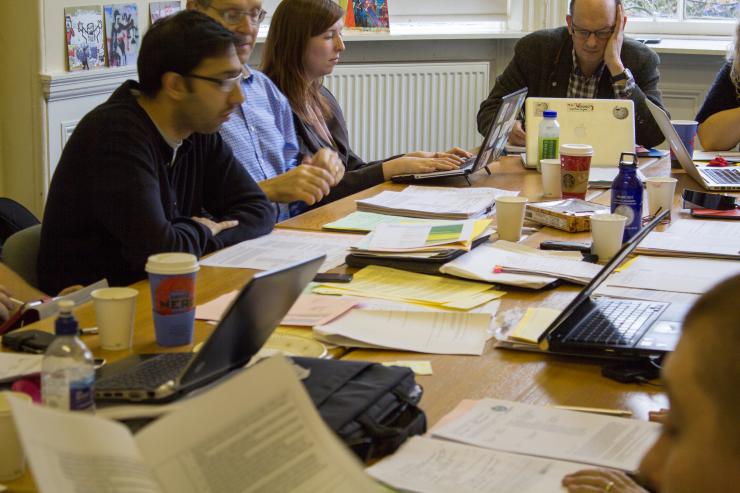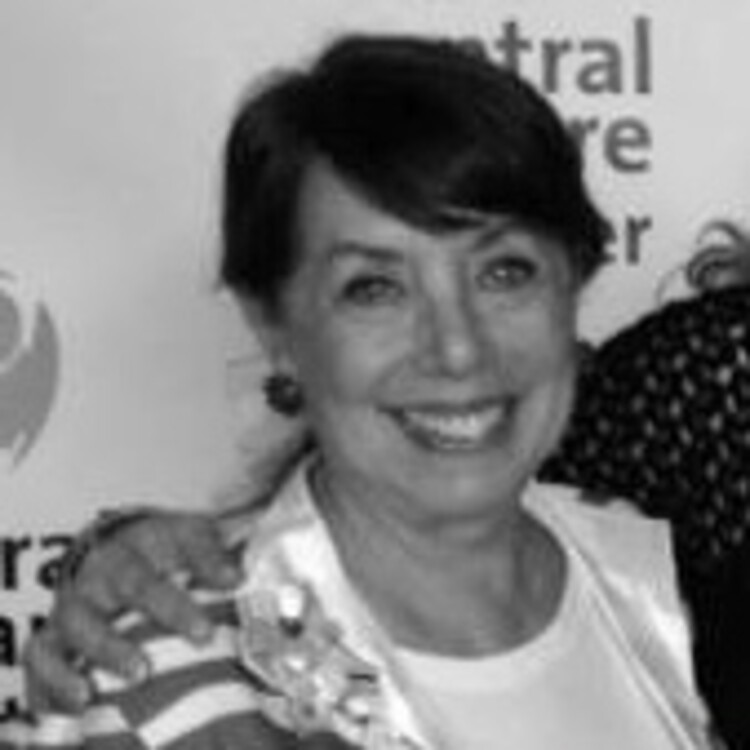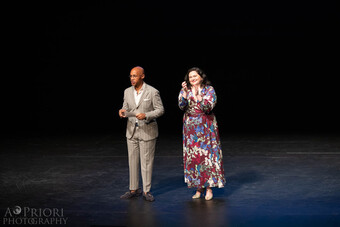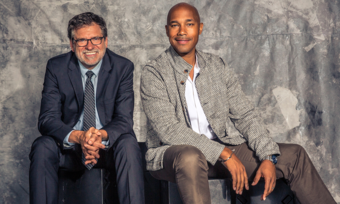Boston Theater Board Leaders Forum
A year ago, I wrote a series for HowlRound looking at what not-for-profit theatre boards across the country were doing. Having been an executive coach in a Kennedy School Executive Development program, I had found the Chait, Ryan and Taylor, Governance as Leadership: Reframing the Work of Nonprofit Boards, model to be a useful way for boards to become more proactive partners in leading their organizations. Deeper board and staff conversations about: purpose vision and business models; building stronger relationships with communities; legislative advocacy for the arts; and new forms of collaborations among and between theatres, all point to the need for an expanded role for theatre boards based on genuinely strategic thinking.
Spurred by the HowlRound series, I contacted a half dozen local board chairs at other mid-sized theatres and proposed a get together to talk about creating a regular forum in which we could share problems, frustrations and ideas—with an eye toward learning and taking useful solutions back to our own boards. Everyone I contacted was interested.
Formation
Location
Our first meeting was at 7:30am, a two-hour breakfast meeting at my house, and while we were more than once offered space at a couple of theatre venues, there was a clear preference for meeting at each other’s homes. A different board chair hosted each meeting, and we met every six to eight weeks with a break over the summer.

Group Norms
At our first meeting, we committed to a norm of confidentiality around sensitive information, a commitment everyone kept, with occasionally humorous results. Once, in a conversation with an artistic director whose board member was part of the forum, I was told, “I know he can’t say what you talk about, but I’m really glad he’s part of the forum.” Our goal was not to be a secret society, but to create a level of comfort that allowed us to share our questions, frustrations, and concerns—without fear of repercussions—and to enable shared learning that we would take back to our boards.
Our goal was not to be a secret society, but to create a level of comfort that allowed us to share our questions, frustrations, and concerns—without fear of repercussions—and to enable shared learning that we would take back to our boards.
Individual Motivations
Without exception, the draw of the forum was the opportunity to talk with peers who were facing the same challenges, to share ideas and experiences, and learn from each other.
More than one board chair was new to the role, and each hoped that talking with more seasoned chairs would provide pieces of a blue print he/she could follow. Several leaders had experience on non-theatre boards, but were concerned about not having experience in the arts. “I wanted to see what was working and not working in other theatres,” and “I wanted to see how others were handling the kinds of issues we were facing.” One leader felt isolated, while another noted she had “longed to do this for years—it’s a rare opportunity to talk with my peers and I’m very excited about it.”
Group Composition
There was also a shared sense that each of the theatre organizations, while different in a number of ways, was similar enough to provide all of us with usable lessons. At one point, we discussed expanding the membership further. However, there was a strong, shared concern that including leaders from either larger local theatres or the small fringe theatres would dilute our focus on shared issues. There was also a level of intimacy that everyone liked, and throughout the year, attendance was almost perfect.
Agendas
Our agendas were a combination of prepared or at least pre-identified topics, with time allotted to talk about whatever was top-of-mind on that particular day. I chaired the meetings, sending out proposed agendas for comment, additions, etc., about two weeks prior to the meeting, and if a conversation bubbled with energy, I tended to let it continue, so occasionally, we would carry over a topic to the next meeting.
Highlights of the Meetings
The fact that we were all a little different, in different phases of development, with different size theatres and budgets, but all facing similar problems seemed to push us to get out of our own little worlds and examine things from a variety of perspectives.
Useful takeaways included sessions in which we explored the following issues:
What works and what doesn’t work in attracting younger audiences?
This presentation focused on the use of social media, the need for younger board members, play selection, marketing that addressed apps for day of show ticket sales, lobby displays and talk backs, use of backstage tweeting, and pros and cons of giving away tickets. “It also got all of us really thinking about the next generation of theatre goers. Who are they?”
Having the Executive Director of Mass Creative (a new Massachusetts state-wide arts lobbying organization) as a guest speaker:
An interesting shift took place during this session: from a “what’s in it for my theatre?” to “how important it is to not just be in our own little bubble?” “It got us thinking about the larger scene,” and how all of our boards, collectively, have the potential to play a significant role as an organized constituency able to exert influence at the legislative level.
Sharing Strategic Planning Experiences:
This session focused on sharing our experience with strategic planning. Two of the theatres had received foundation support to develop a plan with an outside consultant, another theatre revisited an old plan, and one “backed into a plan through a long, home-grown, non-linear process.” A couple of theatres had begun a process, but had not yet finished, and one leader said, “I’m not a believer, they usually end up on a shelf. However, we did have a good board discussion at our last meeting about “Who are we?”
Several leaders also noted the difficulty of getting boards and staff to think strategically: conversations and work were focused primarily at the tactical level, and getting broader more meaningful board involvement in the process remained an important open question.
There was also general agreement that “Having it [a plan] is one thing, but how to use it is another thing entirely.” Implementation has been a challenge for almost everyone, and remained an important topic to revisit at a future session.
Marketing
Everyone had concerns about the traditional approach to marketing. Most agreed attracting qualified staff, given the low salaries most theatres were able to offer, was a problem. The conversation also included the need for more experimentation including: trying group packages to engage new audiences, or shifting from a traditional discount or free tickets approach to a community engagement/community organizing approach. One or two of the theatres was already exploring long-term partnerships with local organizations.
Fundraising: To Have or Not to Have a Gala?
While one or two of our galas raised a significant sum, several felt that given the labor intensiveness of the effort, the cost/benefit was questionable. One theatre had eliminated the gala altogether, doing multiple, smaller fundraisers and an online auction. Another felt that their gala, while providing a “fabulous party,” took up so much staff and board time that there was little time for anything else. “We just can’t do that again. We can’t not do it, but we will have to figure out how to do it differently.” Several theatres hired an outside person to help organize the event, but others could not afford to do so.
Impact
There is no easy way to measure the impact or worth of a group such as this in a one-season time frame, but the two questions that interested us were, “What difference has being in this group made for you personally?” and, “What impact has your being in this group made on your board and/or theatre?”
Personal Value & Community
In terms of personal value, there was unanimous agreement that a genuine community has been created. The sense of “all being in this together” was one of the major benefits of being part of the forum. “It’s been my support group,” one leader said, and another added, “I’ve never left without something really good.” Still another commented, “It stimulates me to think about ideas that have not been pursued in my theatre,” and “We’ve created a safe, confidential place where I can really share.” “I’ve made friends I’ve always wanted to have but didn’t know how to make it happen,” and “It’s been so helpful to know that I/we are not the only one wrestling with something.” “It’s been really validating and has helped preserve my sanity. It’s broadened my perspective,” and “It’s been a reality check for me. Am I asking the right questions?” and finally, “It’s been fun being part of a community.”
One clear benefit of getting to know each other was the number of times a conversation led to a desire for, “Let’s do this together. It doesn’t make any sense to do it separately.” One example includes a preliminary discussion for creating a shared app to enable day of performance ticket sales.
Impact on Boards & Staff
Another way to evaluate impact is to look at what difference being in the group made on the leaders’ boards and/or theatres.
Impact in this context was less robust than at the personal leader level. Two theatres invited the Mass Creative Executive Director to speak to their boards. One meeting has already occurred, and was deemed a success, having generated a lively and action-focused dialogue among the board members. The other meeting will take place in the fall.
Another leader shared parts of the presentation about younger audiences with her board, and, “It helped us think strategically about board composition—younger board members to cultivate and attract a younger audience, and older audience members who potentially have deeper pockets.” Other leaders regularly shared relevant bits and pieces, “anecdotes that let my board know that others are struggling with the same problems, or that we are doing great compared to some others,” and resources and contacts of various sorts were exchanged.
So far, these are small impacts, but it is a promising beginning, and in the forum’s discussion of “what next?” there is a clear commitment to focus next season’s meetings more deeply on what our boards need to do differently, to take ideas back and experiment, and use the forum as a more focused problem solving and peer learning venue.
Next Steps
The Big Picture
“I want us to explore generative issues, not just ‘here’s the answer.’ I’d like to see us spend sixty percent of our time on big picture issues; twenty-five percent on open dialogue; and fifteen percent on best practices at a granular level.” Big picture issues include:
- Who are the audiences of the future here in Boston?
- If subscriptions continue to decrease, what do we need to do?
- What alternative business models should we be exploring?
- What can we solve more effectively together than individually?
- What are new ways to be thinking about cultural philanthropy?
- What is the leadership role of the Board?
- What is strategic thinking and how can that help the board with its leadership role?
Board Impact
Another big issue is how we, as board leaders, can have more impact on our boards, and/or artistic and executive directors? What does being a board leader really entail? Several of us expressed varying degrees of frustration about how difficult it is to get our current boards to be more proactive. Digging more deeply into this issue would pull in issues of board development and composition, and how to build a more proactive board. And to have real impact also necessitates an exploration of how more meaningful partnerships can be developed with our organizational leaders. There was agreement that we need to commit to being more experimental and share our results.
Several of us expressed varying degrees of frustration about how difficult it is to get our current boards to be more proactive.
Collective Action
Our session with Mass Creative clearly sparked an interest in various forms of collective action. Several members want us to leverage our collective board power by meeting with the Mayor. Other potentially collaborative actions across theatres were more tactical, but it was clear this would be a fruitful area to explore.
Session Design
Suggestions pertaining to how we design our sessions going forward included the use of more guest speakers, (e.g. people with expertise in some of the big issues that would help facilitate our dialogues), presentations on best practices that we could research ourselves, peer coaching and problem solving, and the use of key articles we can read and discuss.
Conclusion
Could we have accomplished more, been more focused on board outcomes sooner, been more productive? Possibly, even probably! But we believe our collective desire to continue is a real sign of our success so far. Confidential information has been kept in confidence, trust and respect have developed, and that seems a pretty good foundation on which to continue to build. Time will tell, of course. But the positive vibes, and the specific suggestions for this coming season are all encouraging.
And we hope others will be encouraged to form their own theatre board leaders groups. We’ll be happy to help in any ways we can.
***
* Theater Board Leaders: Alex Baker, SpeakEasy Stage Company; D’Arcy Goldman, Charlestown Working Theater; Cynthia Good, Actors Shakespeare Project; Joan Lancourt, Underground Railway Theater; Paul Levine, New Repertory Theater; Victoria Marsh, Company One Theatre; Steven Wasser, Lyric Stage Company of Boston.











Comments
The article is just the start of the conversation—we want to know what you think about this subject, too! HowlRound is a space for knowledge-sharing, and we welcome spirited, thoughtful, and on-topic dialogue. Find our full comments policy here
Brava Joan! I truly believe the only way for Boston theaters to make significant progress in attracting younger audiences, dealing with subscription fall off, supporting new works, bringing more diverse audiences into the theater, even lowering marketing costs and creating long-term operational strategies-- is to identify, then tackle shared goals as a united front. You've also created a model that is easily portable to other cities who might benefit!
Thanks Deirdre,
I've already heard from a board chair in Seattle and they are planning to launch a group similar to our Forum there. I hope this is a beginning of a trend - with perhaps a HowlRound convening of Board leaders in the not too distant future. As documented in my series of 3 articles last year, there's a lot bubbling around across the country in terms of best practices, and we could learn so much from each other if we created some infrastructures for coming together, physically and virtually.